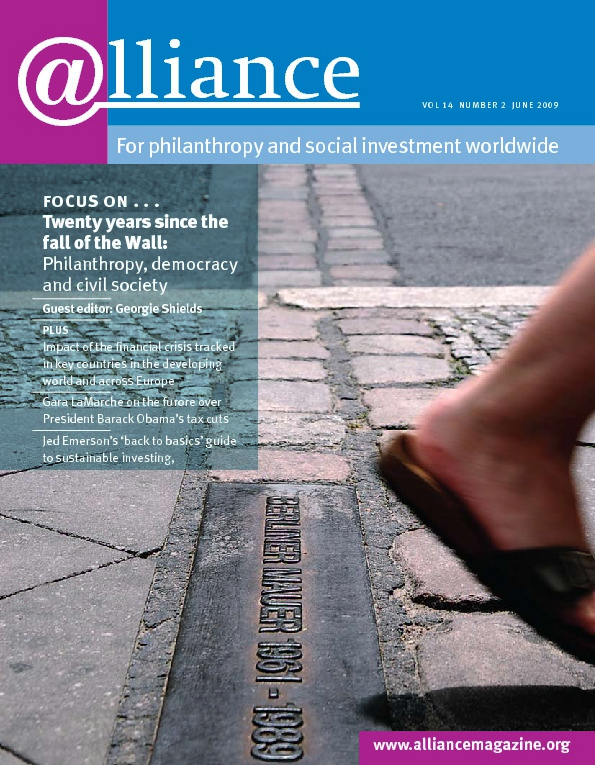The overriding idea that tugged at me as I read these illuminating articles and interviews is that efforts by donors to improve democracy and strengthen civil society are the litmus test of their relevance, humility and commitment. The articles speak to the unsurprising fact that democracy and civil society reflect values, beliefs and practices that are intrinsically shaped by context, even if they are also connected with broad universal standards and existential concerns. Hence, there is never (and should never be) a one-size-fits-all approach.
It’s an unending journey fraught with high risks and disappointments, and when there are accomplishments they often remain fragile. The journey is never easy and there are no sure bets or shortcuts to desired outcomes.
The pieces assembled here are from some of the most experienced donors working to advance democracy and civil society worldwide. They are humbling and instructive, but they also raise many questions that remain unanswered. Are the challenges merely in the nature of the areas tackled (democracy and civil society) or is there also a fault in the strategies that donors use? Is a change of tactics possible when monumental failure stares the donor in the face? How can donors stay ahead of the curve and avoid the disappointments that many of the authors recount?
The narrative begins with the ‘golden age’ of NGOs in fast-transforming societies of the 1990s, when the hideous walls of communism came crumbling down, and apartheid and military dictatorships ended. Everything was possible. It was the age of triumph. Then the lights literally went off, with an authoritarian backlash in many places around the world. As the golden age gave way to the age of despair, there were many civil society casualties. In South Africa, as Christa Kuljian so well explains, the Southern African Grantmakers’ Association (SAGA) collapsed, while the South African National NGO Coalition (SANGOCO) became a ‘shadow of its former self’. Russia became one of the Open Society Institute’s ‘greatest disappointments’, and in other parts of Central and Eastern Europe as well as in Latin America, the gains made have become increasingly tenuous.
Between the opportunities and outcomes, successes and failures, there is ample evidence of compelling vision and impressive courage (Bill Carmichael), innovative ideas and risk taking (Aryeh Neier), commitment and humility (Rayna Gavrilova and Anabel Cruz), conceptual clarity (Pavol Demes and Thomas Carothers), and well-designed programmes backed by sophisticated strategies (Ivan Krastev and Goran Buldioski). There are also the usual donor ficklemindedness, twists and turns.
This grand narrative speaks powerfully to all the imaginable challenges of donors trying to help improve democracy and strengthen civil society anywhere, but especially abroad. So perhaps it is the silent and implicit aspects of the narrative that deserve attention as one seeks to make sense of all of this. I will highlight three such aspects to try to achieve a certain sense of balance.
The burden of responsibility
The first is the ‘burden of responsibility’ that external donors tend to heroically assume for failure (and success for that matter). When donor projects, initiatives or programmes to advance democracy and civil society fail, despite heavy financial investments, is responsibility necessarily the issue or is it also a reflection of a more complicated evolutionary dynamics? Isn’t the high tide of democratic boom always necessarily followed by a low tide of democratic recession? Civil society, we know, is an eco-system of associational life, with a mosaic of constitutive elements (some progressive, others reactionary). It evolves in dialectical twists and turns, and never in a straight, linear direction. Given this, at what point does a donor cut loose and leave?
Equally important is the question of what should be the appropriate role for donors. Reading the pieces assembled here, I couldn’t help but wonder whether it wasn’t perfectly appropriate for donors to limit themselves to strengthening NGOs (including think-tanks) and helping to secure an enabling environment for their growth. Besides, there are many parts of civil society (such as funeral societies in Africa and social movements) that are and must remain self-sustained and are better off left alone. As an example of real achievements, there can be little doubt that the efforts described by Ivan Krastev and Goran Buldioski to strengthen think-tanks in Central and Eastern Europe have laid a foundation for independent policy analysis in the future.
The role of indigenous philanthropy
The second element in the grand narrative is the role of indigenous philanthropy. For good reason, most of the articles focus on the role of external philanthropic institutions. The question, though, is: was there a price paid for neglecting to seriously engage indigenous philanthropic traditions and institutions in embarking on what, by all accounts, is a marathon journey of democratization and civil society strengthening? Our best instincts should alert us to the fact that often the best and most enduring support we can give any society is to help strengthen the ways in which members of that society help each other when in need. As Friedrich Von Hügel aptly put it: ‘The golden rule is to help those we love to escape from us.’ This goes to the heart of the issue of sustainability that Thomas Carothers identified as a proxy for best practice in this field, and which Olga Alexeeva also highlighted in her piece.
A too limited timeline
The third element concerns what must be the most appropriate timeline for reflection, stock-taking and analysis. The fall of the Berlin Wall is set as the point of departure. This is understandable, for that was an epochal event which reverberated in many parts of the world and transformed the post-war global balance of forces.
On the other hand, the recuperative instincts and skills of dictators do not dissipate overnight; nor did the Iron Curtain represent all there was by way of obstacles to democracy and civic participation. For many closed societies outside Europe, where the trajectory of iron-clad dictatorship and oppression spans centuries not decades, any status review of democratization that is limited to the 1990s is bound to produce a narrative that is dimmer than warranted. In Africa, for example, the end of colonialism might offer a more relevant starting point for analysis and review.
These problematic elements notwithstanding, this is a fascinating collection of reflections which can help to redress the unequal ‘balance of stories’ that reflect the often uneasy relationship between donors and their grantees. It is an honest self-appraisal, and that is refreshing. Donor candour about failure is not the norm, so fresh ground is broken here.
Looking to the future
The most significant lesson, then, is to take a long-term approach to our work on democracy and civil society, and never to quit. This has a twofold strategic import. First, it requires that donors do more than grantmaking so they can journey in partnership with their grantees. Second, it calls for a willingness and ability to plug into existing initiatives, as opposed to always designing new ones. All across the developing world, there are new philanthropic institutions that operate by these principles. At TrustAfrica, for example, we utilize an integrated programming strategy of convenings, philanthropic advocacy and resource mobilization, technical assistance provision, and grantmaking to enable democracy-building NGOs to take their work to scale and sustain themselves, especially in crisis situations such as in Zimbabwe or in post-conflict societies such as Liberia. We also constantly seek to ‘plug into’ existing initiatives that hold promise for long-term impact, such as the work of Humanity United in helping Liberian NGOs become more financially sustainable.
In the end, donors and funders are only modest players who cannot and should not attempt to do everything alone. If we recognized this, we would accomplish more successes that endure.
Akwasi Aidoo is Chief Executive of TrustAfrica.
Email aidoo@trustafrica.org
 Billy Nthelebovu – What democracy means to me.
Billy Nthelebovu – What democracy means to me.
To me, democracy means that society leads and government serves. People should be able to tell the government what their needs are and they should have sense of ownership of government programmes. Democracy gives people a platform for participating of issues affecting their own development and a chance to make choices on issues that matter to them without fear of prejudice.
How important are civil society organizations?
During the apartheid era, NGOs mobilized the community against the South African regime. Protest marches and resistance campaigns were supported by NGOs. Interestingly, white NGOs also played a role during the liberation struggle, particularly those promoting human rights. Organizations such as Black Sash were also able to leverage resources offshore to finance activities. Faith-based organizations, such as the South African Council of Churches, also played a significant role in achieving democracy.
NGOs contribute significantly to nation building and creating social cohesion. They rely heavily on donor funding. In Africa most NGOs receive funding from international communities but the trends have recently changed dramatically, especially with the global financial meltdown.
What opportunities do you have to participate in your community and your country?
Every citizen in South Africa is given a platform to make inputs in policies and statute formulation. Consultative forums are created so that people can make inputs on white papers before they are enacted. A wide range of civic structures, such as the Community Development Forum and Community Policing Forums, were created in which people can participate regardless of their political affiliation. South Africa is striving to ensure people enjoy their human rights and there are institutional mechanisms to protect people’s rights.
Billy Nthelebovu is on the staff of the South African Youth Development Network. Email billy@ydn.org.za





Comments (0)